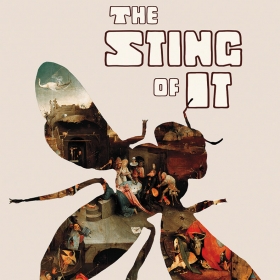If you love exquisite language, don’t miss The Sting of It, the first full-length of poems by AJ Odasso ’05.

AJ Odasso ’05
The Sting of It
Tolsun Books
82 pages; $17.50
If you love exquisite language, don’t miss The Sting of It, the first full-length book of poems by AJ Odasso ’05. From the opening page, Odasso balances splendid sounds and stunning imagery with the sharp realization “that eternity/ is a pivot-swing” and “We are here waiting/ for death, for an answer, for the door—.”
The door that subsequently opens for readers leads to work that is both classical and modern, restrained and deeply moving. Odasso, who uses the pronouns they, their, theirs, has said in interviews that their earliest influence was Shakespeare’s sonnets. The poet effortlessly echoes the cadence and beauty of the Bard’s writing while also creating a distinctive, vital voice.
The book’s first section presents a panoramic view of death and grief, where the limitations of physical life prompt the speaker, at various points, to exclaim “I’ve had enough of loss” and “Trust/ is more often than not for the weak.” Those perceptions are balanced by the wise insights that words and the body are intricately connected and thoughts sow words, which can sow dissent.
In the second half, the poet, who majored in English at Wellesley and earned a master’s in interdisciplinary medieval studies at the University of York in 2006, employs a close-range lens, describing a time bomb in “this body, weeded already/ of cysts, endometrium, womb” and the awareness that “Other mutations may exist.”
As the work progresses, the speaker deals with the temporary effects of swine flu and the lasting impact of the CHEK2 genetic marker, which indicates an elevated risk of breast cancer. Recollections of pivotal lovers, the impact of an autistic brain, and a childhood where “Three pretty sisters/ obscured my looks” also shape the writing, as do fierce intelligence, the example of strong older women, and another “wayward daughter” who “refused/ to bend beneath your father’s lash.”
Those influences and more contribute to a complex yet precise narrative that draws on mythology and creates its own. The speaker, while stung by mortality, refuses to cower or be silenced, instead “Writing on the body, always/ writing on the body, always/ stories on bodies I am fighting/ to keep alive.”
This elegant collection, an expanded version of Odasso’s poetry thesis for their M.F.A. at Boston University in 2016, was shortlisted for the 2017 Sexton Prize, under a different title. It deserves to be savored and celebrated by a wide audience because it shows how language, when used well, can bring shivers and solace to many.
Lund regularly reviews poetry for the Washington Post.

